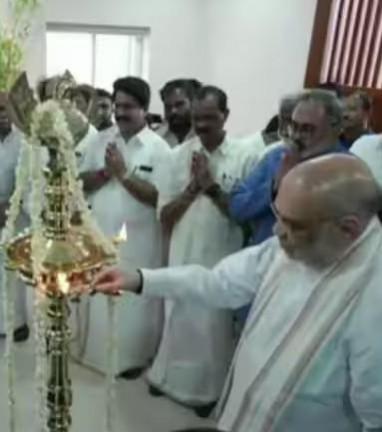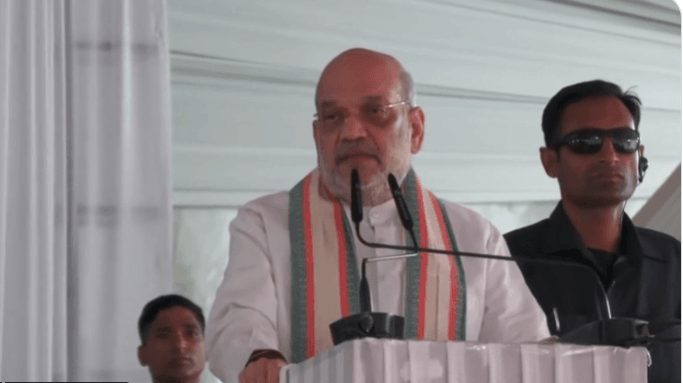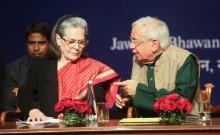
Union Home Minister Amit Shah inaugurated the newly constructed Kerala BJP state committee office in Thiruvananthapuram on July 12. This event marked a significant milestone for the Bharatiya Janata Party (BJP) as it seeks to expand its influence in a state where it has traditionally faced challenges.
The new office, named Mararji Bhavan in honor of the late K.G. Marar, a former state BJP president, stands as a symbol of the party's ambitions in Kerala. The seven-storey building, equipped with modern amenities including 13 suite rooms, reflects the party's commitment to establishing a robust presence in the region.
Amit Shah's visit to Thiruvananthapuram was marked by a series of symbolic gestures. Arriving late on Friday night, Shah visited the office complex the following morning, where he hoisted the party flag and planted a sapling, symbolizing growth and renewal. His tour of the building underscored the importance of the new facility in the party's strategy to strengthen its base in Kerala.
The land on which Mararji Bhavan stands has its own historical significance. It was once the site of the ancestral home of a former Congress Union Minister. The property was later acquired by senior BJP leader P.P. Mukundan, who is known for his close association with Prime Minister Narendra Modi during the formative years of the BJP's rise to prominence.
The construction of the new office began under the leadership of former BJP state president Kummanam Rajasekharan, highlighting the continuity of the party's vision for growth in Kerala. However, the project was not without controversy. The revelation that the building would include a dedicated room for a future BJP Chief Minister of Kerala sparked debate, given the party's limited electoral success in the state. The BJP had secured a single Assembly seat in 2016, which it subsequently lost in the 2021 elections.

Revitalizing the Party's Presence
Despite these challenges, the party has been buoyed by recent successes, such as actor-turned-politician Suresh Gopi's victory in the Thrissur Lok Sabha seat during the 2024 general elections, which led to his inclusion in the Union Cabinet. Shah's visit coincided with a major organizational reshuffle within the Kerala BJP, led by Rajeev Chandrasekhar. The revamped state committee aims to blend youthful energy with seasoned experience, a strategy designed to rejuvenate the party's internal dynamics. The immediate challenge for the new leadership is to make a significant impact in the upcoming local body elections, which are seen as a critical test of the party's growing influence in the state.
Following the inauguration, Shah was scheduled to address a public meeting at the Putharikandam Maidan, where a large gathering of nearly 30,000 party workers was expected to attend in person, with an additional one lakh participating virtually. This event was viewed as a major mobilization effort in preparation for the local polls.
Later, Shah planned to visit Kannur to offer prayers at the Thaliparambu Rajarajeshwara temple before returning to Delhi. The inauguration of Mararji Bhavan and the subsequent events highlight the BJP's strategic efforts to consolidate its position in Kerala.
The party's focus on organizational restructuring and grassroots mobilization reflects a broader strategy to expand its electoral footprint in a state where it has historically faced challenges. Historically, the BJP's efforts in Kerala can be compared to its earlier expansion strategies in other regions where it initially had limited influence. For instance, the party's rise in states like West Bengal and Assam involved similar strategies of building a strong organizational base, leveraging local leadership, and capitalizing on regional issues to gain electoral traction.
Strategic Vision for Kerala
In Kerala, the BJP's approach appears to be following a similar trajectory, with an emphasis on strengthening its organizational structure and engaging with local communities to build a sustainable support base. The party's focus on youth and experience in its revamped state committee is reminiscent of its successful strategies in other states, where a blend of fresh perspectives and seasoned leadership has helped the BJP navigate complex political landscapes. This approach is particularly relevant in Kerala, where the party faces the dual challenge of overcoming entrenched political rivalries and appealing to a diverse electorate.
The inclusion of a dedicated room for a future BJP Chief Minister in Mararji Bhavan, despite the party's current electoral standing, underscores the BJP's long-term vision for Kerala. This move reflects the party's confidence in its ability to eventually secure a significant political presence in the state, a goal that has been a part of its broader national strategy. The BJP's strategic focus on Kerala is part of a larger effort to expand its influence across southern India, where it has traditionally faced challenges in gaining a foothold.
The party's efforts in Kerala are also indicative of its broader strategy to strengthen its presence in states where it has historically been weak. By focusing on organizational restructuring, grassroots mobilization, and strategic alliances, the BJP aims to build a sustainable support base in these regions. The party's emphasis on youth and experience in its leadership structure is designed to appeal to a diverse electorate and address the unique challenges of each state.
The inauguration of Mararji Bhavan marks a significant milestone in the BJP's journey in Kerala. The new state committee office, coupled with the party's organizational reshuffle and strategic focus on upcoming elections, signals a renewed commitment to expanding its influence in the state.















